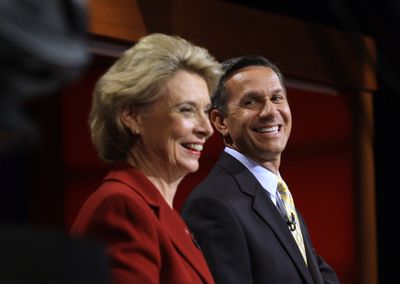Gregoire, Rossi offer few specifics in first debate

SEATTLE – Gov. Chris Gregoire and her Republican opponent, Dino Rossi, sparred in an hour-long debate Saturday night on issues ranging from the environment to the economy.
Rossi quickly seized on bad news that emerged this week on two fronts, saying the state’s 6 percent unemployment rate and a looming deficit prove that the incumbent has mismanaged the state.
Gregoire acknowledged the state faces tough times, but put the blame squarely on the Bush administration.
“No place in America has escaped the failed economic policies of the George W. Bush administration policies that my opponent has supported,” she said.
On Tuesday, officials announced the state’s jobless rate jumped to 6 percent, the highest level in nearly four years, and that more than 200,000 were people unemployed and seeking work.
There was more bad news Thursday when the state’s revenue forecast dropped by $530 million, pushing a projected deficit in the next budget to about $3.2 billion.
“It’s not a revenue problem, it’s a spending problem,” Rossi said.
He said several times throughout the debate that he wants to turn Washington into an “entrepreneurial state” and that Gregoire would raise taxes and make it difficult for small business owners.
“Nothing is going to change unless you change the people in Olympia,” he said.
Both said they would not raise taxes, but neither gave specifics on how spending should be reduced to meet the anticipated shortfall.
In his opening statement, Rossi criticized Gregoire for a series of television ads on embryonic stem cell research and his opposition to it. Rossi said he supports the use of adult stem cells, and the ads are “trying to distract us from the issues that most people in the state are talking about.”
Gregoire said it was important to point out the differences between herself and Rossi.
“We disagree on priorities, we disagree on values, from stem cell research to global warming,” she said. “Let’s move forward as a state. Let’s not compromise our values or our priorities.”
The debate covered several other issues, including transportation, the environment, crime and education.
Gregoire has made the health of Puget Sound a cornerstone of her campaign and as governor has signed several environmental bills into law, including the creation of the Puget Sound Partnership, a state agency responsible for determining the health of the sound and setting priorities for meeting the goal of a healthy sound by 2020.
“We need a plan that is bold and is leadership-driven,” she said. Rossi “has no plan to do anything about Puget Sound and no plan on global climate change.”
Rossi said that his plan to improve the state’s transportation system will lower emissions. He didn’t offer any other specifics on Puget Sound or other issues, but said he would be a “very good environmental steward.”
The debate was split into two segments with questions in the first half from reporters and the candidates standing behind podiums. In the last half hour, Gregoire and Rossi fielded taped questions from voters while sitting on plush chairs.
It was the first opportunity Gregoire and Rossi had to move their campaign from the airwaves to a live encounter before about 80 people at a television studio.
In his closing statement, Rossi promised to balance the budget without raising taxes and said he would turn the state into the “worst place to be a criminal and the best place to run a business.”
Gregoire said she also would balance the budget and be fiscally conservative without compromising “our values or our priorities. I’m ready to see us through these challenged times.”
The debate was the first of six between in the weeks leading up to a rematch that is likely to be among the most competitive governor’s races in the nation.
The debate was sponsored by Fisher Communications, the Seattle Post-Intelligencer and the League of Women Voters.